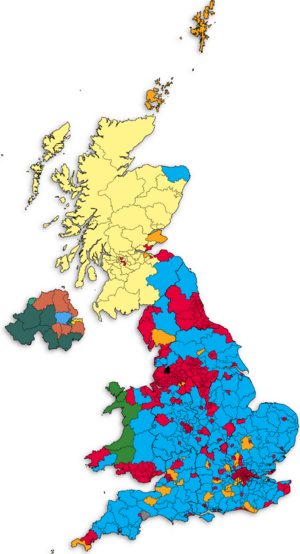2022 United Kingdom general election
| ||||||||||||||||||||||||||||||||||||||||||||||||||||||||||||||||||||||||||||||||||
All 682 seats in the House of Commons 341 seats needed for a majority | ||||||||||||||||||||||||||||||||||||||||||||||||||||||||||||||||||||||||||||||||||
|---|---|---|---|---|---|---|---|---|---|---|---|---|---|---|---|---|---|---|---|---|---|---|---|---|---|---|---|---|---|---|---|---|---|---|---|---|---|---|---|---|---|---|---|---|---|---|---|---|---|---|---|---|---|---|---|---|---|---|---|---|---|---|---|---|---|---|---|---|---|---|---|---|---|---|---|---|---|---|---|---|---|---|
| Opinion polls | ||||||||||||||||||||||||||||||||||||||||||||||||||||||||||||||||||||||||||||||||||
| Registered | 48,636,047 | |||||||||||||||||||||||||||||||||||||||||||||||||||||||||||||||||||||||||||||||||
| Turnout | 69.9% ( | |||||||||||||||||||||||||||||||||||||||||||||||||||||||||||||||||||||||||||||||||
| ||||||||||||||||||||||||||||||||||||||||||||||||||||||||||||||||||||||||||||||||||
 A map presenting the results of the election, by party of the MP elected from each constituency. | ||||||||||||||||||||||||||||||||||||||||||||||||||||||||||||||||||||||||||||||||||
 Composition of the House of Commons after the election | ||||||||||||||||||||||||||||||||||||||||||||||||||||||||||||||||||||||||||||||||||
| ||||||||||||||||||||||||||||||||||||||||||||||||||||||||||||||||||||||||||||||||||
The 2022 United Kingdom general election was held on Thursday, 14 July 2022 to elect members to the House of Commons. The governing Conservative Party, having previously enjoyed an uninterrupted twelve-year-long reign in power was defeated by a coalition consisting of the Labour Party, the Liberal Democrats, and the Hanoverian Union Party, which had previously been in a coalition with the Conservative Party before withdrawing from it in June 2022. In the end, neither party was able to achieve a majority of seats in the House of Commons, although the tripartite coalition allowed the Labour Party to lead a coalition government with the Liberal Democrats being a junior partner, while the Hanoverian Union Party, despite also being a member of the coalition, opted to take a largely non-active role, with none of its MPs choosing to take up a position in the new administration.
In the days leading up to the election, multiple scandals plaguing the Conservative Party led pollsters to speculate on either a Labour majority victory or a Labour minority victory, both of which were hotly debated among both pollsters and the general public. Nonetheless, pollsters were unanimous in showing a firm but tiny lead for Labour against the Conservatives. In any case, on June 10th 2022, the leaders of the Labour Party, the Liberal Democrats, and the Hanoverian Union Party jointly agreed to form a tripartite coalition, with the expectation that should Labour fail to achieve a majority of seats in the House of Commons, the total amount of seats combined from all three parties would prove enough to form a majority coalition government in the lower house. In the meantime, the leaders of all three parties jointly campaigned on a promise to "effectively reverse the many errors of the downright shameful Conservative government", while McLoughlin himself campaigned on the premise of a "fresh start" under a new Conservative administration, one which would supposedly differ from the previously scandalous and widely unpopular David Cameron administration.
On Election Day, the Labour Party won a total of 310 seats, their best record to date since 2005, while the Conservatives retained only 241 seats, having lost 168 seats of theirs in the election. On the other hand, all three parties, namely the Scottish National Party, the Liberal Democrats, and the Hanoverian Union Party together saw an increase in their respective share of seats, with the SNP making a total net gain of just one single seat, while the Liberal Democrats were able to considerably expand their share of seats with a gain of 26 seats in total, thereby bringing their total share from 9 to 35 seats. Meanwhile, the Hanoverian Union Party only gained one seat only (while also possessing the second largest swing in popular votes among all five parties), that being a Conservative seat in Hanover, which the party has traditionally dominated for nearly a century.
Consequently, Prime Minister Patrick McLoughlin, whom has been in power for only thirty-eight days in total, promptly resigned, and was promptly succeeded in his post by Labour leader, Keir Starmer, while Liberal Democrats leader, Ed Davey succeeded his Conservative predecessor, Robert Halfon as deputy prime minister, becoming the second to do so from his party after Nick Clegg, whom served as deputy to then-Conservative leader, David Cameron from 2010 to 2015.
Due to the election having taken place just roughly two months after the 2022 Australian federal election in May 2022, the two elections have consequently become frequent subjects of comparison, as both elections saw the countries' respective labour parties unseating an opposing center-right party that had been in power for nearly a decade long.
Background
Prior to the election, the Conservative Party had been in power for nearly twelve years, beginning with their victory in the 2010 general election, in which David Cameron successfully defeated the incumbent Labour Party prime minister, Gordon Brown. Then, throughout the following years, the Conservatives subsequently won two further general elections with the 2019 general election resulting in their best result to date.
COVID-19 pandemic
Beginning in 2020, the ongoing COVID-19 pandemic began to take shape in the United Kingdom. However, the Conservatives initially benefited somewhat thanks to a rather promising response to the outbreak of the pandemic in the country, although this trend proved to be rather inconsistent in the following months. Ultimately, around a year later, the ruling Conservative Party would begin to face a series of claims and assertions made by various parties claiming that members of the government, including then-Prime Minister David Cameron had been breaching lockdown rules and public health restrictions by hosting a number of gatherings and other social events. Almost immediately, these claims promptly resulted in a public backlash against the government, with many members of the public, as well as members of the Opposition beginning to call for the government to be held to the same standards as members of the public, that being by receiving fines or other forms of punishment for their offences.
Sue Gray report
On May 25th 2022, a report published by Sue Gray, a British civil servant, severely implicated the ruling Conservative Party. In turn, members from the Opposition and from the public begin to demand the prime minister's resignation, with Labour Party leader, Keir Starmer stating, "For those who are still doubtful or are on the fence on this whole matter, this (Sue Gray report) says it all, and therefore, an immediate resignation is necessary". Despite this, for the first few hours after the report was published, David Cameron himself initially showed no signs or plans to immediately resign in response to the report. However, on that day, at approximately 2:30 P.M., Cameron, by way of a press conference, announced his intent to resign as prime minister, which promptly sparked a leadership election to select his future successor as the leader of the Conservative Party. Eventually, on June 5th 2022, the party chose Secretary of State for Transport, Patrick McLoughlin to succeed Cameron as both the party leader and prime minister, which he did so the following day at 8:15 A.M.
General election
Pre-Election Day
However, on June 9th 2022, just three days into his premiership, McLoughlin announced that a new general election will be held, so as to confirm his party's huge majority in the House of Commons. In response, throughout the following days, the Conservatives largely ran on a platform of a "fresh start", a signal of the new McLoughlin administration's apparent departure from the previously scandalous and widely unpopular Cameron administration, while the Labour Party, along with fellow coalition partner, the Liberal Democrats otherwise ran on a mostly similar platform, while also notably emphasising the Conservative Party's mounting scandals beforehand. At the same time, opinion polls mostly predicted a minority win for the Labour Party, whom, it was hoped, would then be able to form a working majority government with the likes of the Liberal Democrats and the Hanoverian Union Party, which had previously been in a longtime coalition with the Conservative Party before eventually departing from it amidst the latter's mounting scandals and an increasingly negative reputation among the British public.
Election Day
On July 14th 2022, the day of the general election, the Conservative Party saw a considerable loss of approximately 168 seats while the Labour Party and the Liberal Democrats respectively gained 140 and 26 seats. By the end of it, the Labour-Liberal Democrats coalition was able to achieve a narrow majority in the House of Commons with 345 seats, just four seats above the 341 seats threshold. However, the participation of the Hanoverian Union Party in the now three-way coalition gave the new coalition government 373 seats in total, which, to some extent, slightly strengthened the government's hold of the lower house.
Aftermath
The day after the election concluded, McLoughlin promptly resigned, making him the shortest-serving British prime minister in history at 38 days. He was then replaced by Labour Party, Keir Starmer as prime minister, while his deputy, Robert Halfon is otherwise replaced by the Liberal Democrats leader, Ed Davey as deputy prime minister.
Almost immediately, the reactions from the side of the Labour Party and the Liberal Democrats were largely positive, while those of the Conservative Party's were otherwise largely negative and critical of the results, with Michael Gove, whom had previously served under the Cameron administration before being fired for his pro-Leave stance on the European Union referendum, criticised McLoughlin for what he called a "massive tactical failure", while also labelling the former prime minister an "unabashed idiot" for his decision to call a general election after just a few days into his premiership, thereby breaking the Conservative Party's nearly twelve-year-long uninterrupted time in power. A day after the election concluded, McLoughlin announced his resignation as party leader, and on July 26th 2022, was replaced by Liz Truss, whom previously served as Secretary of State for Environment, Food and Rural Affairs under the two previous Conservative administrations.
Meanwhile, with the likely implementation of a proportional representation electoral system for future general elections, the 2022 general election could potentially be the last general election in British history to ever use the traditional first-past-the-post electoral system, which has been in place since the 20th century.




